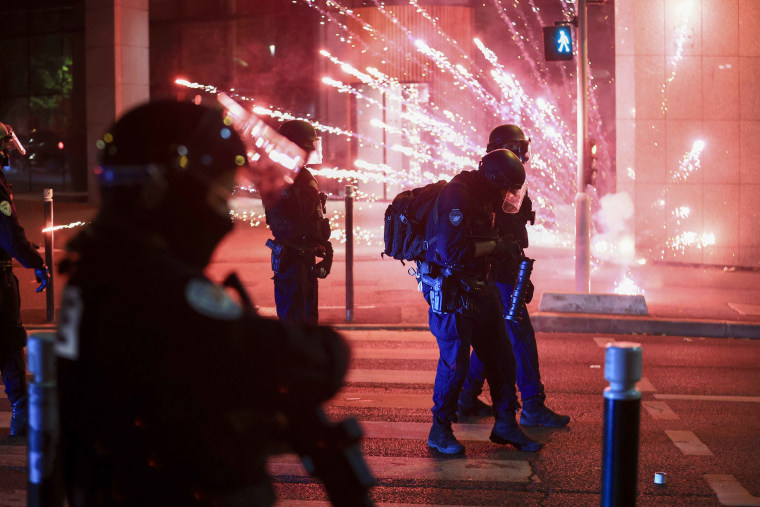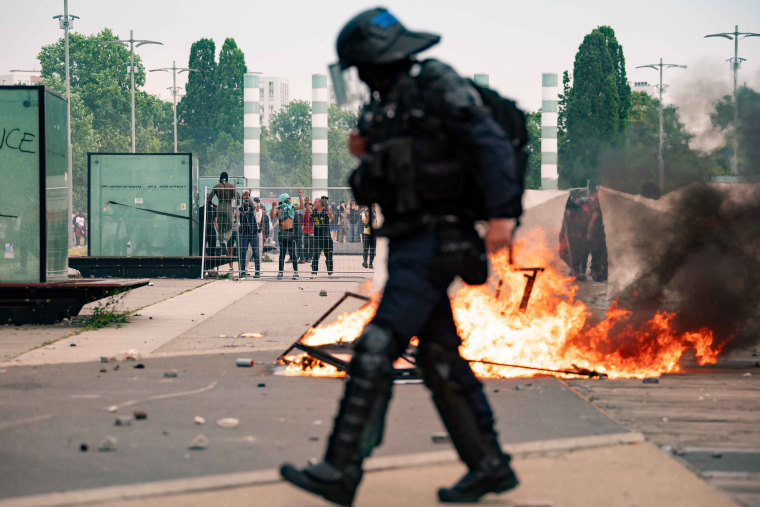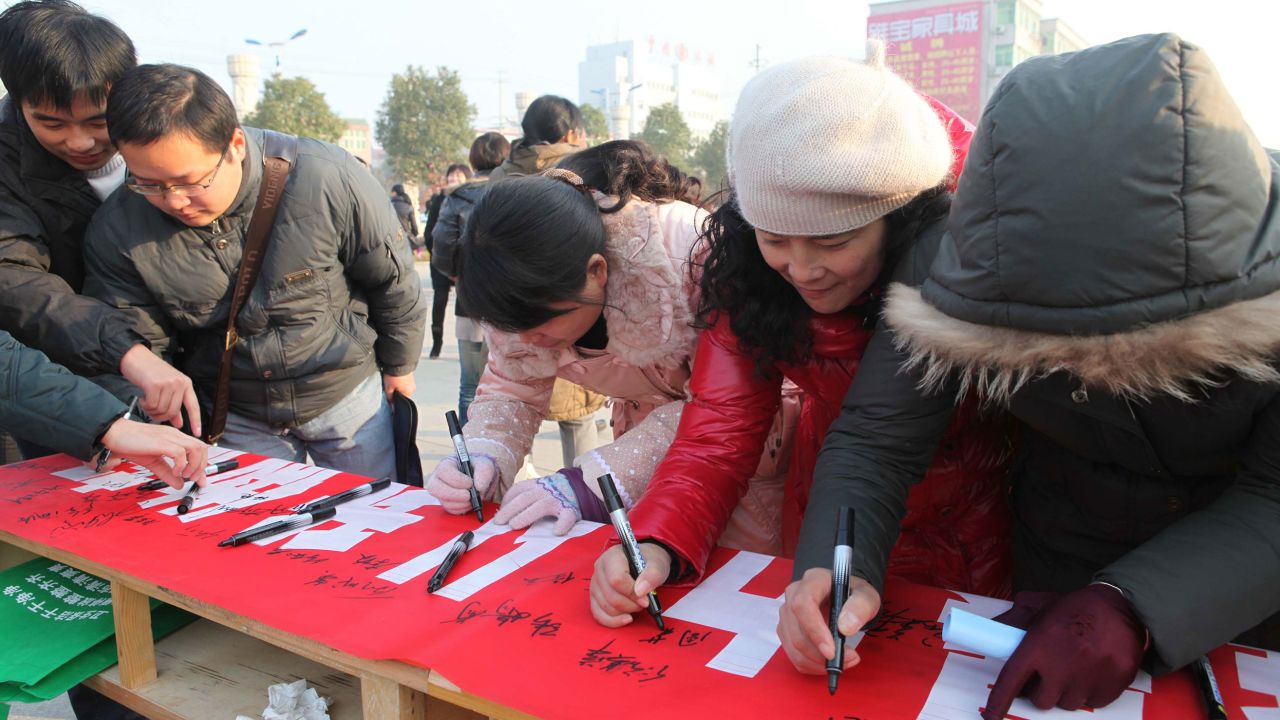Violent unrest sweeps France after police fatally shot a teen driver
PARIS — France was reeling Friday from a third night of violent unrest over the deadly police shooting of a 17-year-old boy, a killing that sent a shockwave of anger across the country and inflamed long-standing tensions over the treatment of its ethnic minorities.
Streets were ablaze Thursday night as protesters erected barricades, torched cars and looted stores, while security forces fired tear gas and detained hundreds of people. French President Emmanuel Macron decried the "absolutely unacceptable" unrest and convened crisis meetings, but stopped short of calling a state of emergency as he scrambled to restore order.
The deadly shooting of the teenager — who was only identified by his first name, Nahel — occurred during a traffic stop in the Paris suburb of Nanterre. The officer accused of the killing has been given a preliminary charge of voluntary homicide.
The legal team of the teenager's family hasn't said if it believes race was a factor in the shooting, which has stirred long-simmering tensions between French police and young people living in disadvantaged neighborhoods in the suburbs of the capital and elsewhere.


'It needs to stop'
The victim's mother, identified as Mounia M., told France 5 television that she was angry at the accused officer, rather than at police in general.
“He saw a little, Arab-looking kid, he wanted to take his life,” she said. “A police officer cannot take his gun and fire at our children, take our children’s lives.”
The family has roots in Algeria, the teenager’s grandmother told the country’s Ennahar TV. The Algerian Foreign Affairs Ministry said in a statement Thursday that grief was widely shared there.
A family friend in France told NBC News that the actions of the country's law enforcement were starting to mirror those in the United States.
“They kill us, they stop and search abusively, they abuse their authority — it needs to stop,” said Anais, 27, who didn’t want to give her last name. The “problem here is becoming like the United States,” she said, though adding that “there are some good police officers."
As is often the case, it was difficult to separate peaceful protests by the victim’s friends and family from widespread unrest about other related issues that appeared to use the incident as a springboard.
What started off as a march in honor of Nahel in Nanterre on Thursday afternoon had by nightfall morphed into the the latest wave of clashes over his death.
Cars and garbage cans were set on fire as police fired tear gas into the crowds. The unrest spread as far as the city of Marseille in the south, and related scuffles were reported in Brussels.

Authorities have deployed 40,000 police to the streets and detained more than 900 people, with around 200 officers injured, officials said. No information was available about any others injured.
Macron, who returned to Paris from a European Union summit, held his second crisis meeting in two days. The president urged parents to keep their children home and said he had been in contact with social media firms asking them to monitor and remove content inciting violence.
“The two nights we have just experienced are part of a situation which is absolutely unacceptable and unjustifiable,” Macron said.
He accused those involved in the protests of opportunistically exploiting "the death of a teenager, which we all deplore."
But in a punchy statement Friday the National Police Union Alliance said in a statement that “all means must be put in place to restore the rule of law as quickly as possible,” and words were not enough.
“Faced with these savage hordes, asking for calm is no longer enough, it must be imposed,” it said.
Video captured the shooting
The government has stopped short of declaring a state of emergency — which it did in 2005 after the death of two boys fleeing police caused widespread rioting.
Meanwhile, lawyers for the officer accused of pulling the trigger, who is kept anonymous by French law, said his client was sorry and “devastated.” Attorney Laurent-Franck Lienard told France’s BFM TV, “He doesn’t get up in the morning to kill people. He really didn’t want to kill.”
Footage filmed by bystanders showed two police officers leaning into the driver-side window of a yellow car, with one of them appearing to fire a shot as the vehicle pulls away. The car crashed into a post nearby and prosecutors said the driver died at the scene.
Prosecutor Pascal Prache said the officers tried to stop Nahel because he looked so young and was driving a Mercedes with Polish license plates in a bus lane. He allegedly ran a red light to avoid being stopped and then got stuck in traffic.
Prache said his initial investigation showed that “the conditions for the legal use of the weapon were not met.” The officer has been handed preliminary charges, which mean magistrates strongly suspect wrongdoing but need to investigate further before they can send the case to trial.
The case has led to renewed outrage from campaigners who allege institutionalized discrimination by law enforcement — and that the nation’s official commitment to colorblind universalism only serves to entrench widespread racism.
“How do we make it so that we have a police force that when they see Blacks and Arabs, don’t tend to shout at them, use racist terms against them and in some cases, shoot them in the head,” said Dominique Sopo, head of the campaign group SOS Racisme.
The United Nations human rights office said the killing was a moment for the country to address deep issues of racism and racial discrimination in law enforcement,” spokesperson Ravina Shamdasani said in a statement. She called on the country to ensure that “the use of force by police” was proportional, legal and nondiscriminatory.
Matt Bradley, Laura Saravia and Nancy Ing reported from Paris, and Alexander Smith reported from London.






